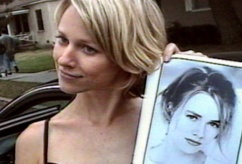| Ellie Parker |
| |
 |
USA, 2005. Rated R. 94 minutes.
Cast:
Naomi Watts, Rebecca Rigg, Scott Coffey, Mark Pellegrino, Chevy Chase, Jennifer Syme, Blair Mastbaum, Johanna Ray, David Baer
Writer: Scott Coffey
Original Music: Neil Jackson; songs performed by Built Like Alaska
Cinematography: Scott Coffey and Blair Maustbaum
Producers: Scott Coffey, Naomi Watts, Matt Chesse, Blair Mastbaum
Director: Scott Coffey
LINKS
|
 llie Parker began as a sixteen-minute short that appeared at the 2001 Sundance Film Festival. And it shows. Writer/director Scott Coffey and Naomi Watts collaborated on three more short films, which have been strung together for this feature-length release. The first sixteen minutes of Ellie Parker are the original short film, and almost by themselves make the whole movie worth seeing. The film contains a few additional highlights, but rapidly loses steam as it attempts to delineate a story arc. Ellie Parker doesn't tell a story so much as it captures a reality.
llie Parker began as a sixteen-minute short that appeared at the 2001 Sundance Film Festival. And it shows. Writer/director Scott Coffey and Naomi Watts collaborated on three more short films, which have been strung together for this feature-length release. The first sixteen minutes of Ellie Parker are the original short film, and almost by themselves make the whole movie worth seeing. The film contains a few additional highlights, but rapidly loses steam as it attempts to delineate a story arc. Ellie Parker doesn't tell a story so much as it captures a reality.
Ellie Parker is a satirical take on the scrapping existence of struggling actors in Hollywood, people not unlike Watt's character in Mulholland Drive. Ellie Parker opens with Watt's titular heroine playing a corpse, but wanting to portray her character's last breath for the camera. The director declines. Coffey then follows Ellie as she ping-pongs around town in her car, racing from audition to audition for hilariously bad parts made worse by Ellie's tendency toward melodrama. At her first audition, for some sort of tragic Southern belle with a director named “Smash” (co-producer and co-cinematographer Blair Maustbaum), she imagines herself in bizarre settings to get into the role. Then it's back to her car, where she sings to Blondie, puts on makeup, curses other drivers, speaks on the phone, rehearses her lewd lines in a bad New York accent, and does a complete outfit change—simultaneously.

Ellie Parker (Naomi Watts) holds up a head shot in Ellie Parker. |
That's the original short. However, the project became a labor of love for Watts and Coffey, even as Watts was becoming a big huge star. Over the next few years, they expanded the project with more and more material, grabbing time in between Watts' other films.
After that, Ellie heads home where we meet her infantile boyfriend Justin (Mark Pellegrino), who tends to respond to all of Ellie's emotional needs, no matter what they are, by making a pass at her. We meet her therapist. Ellie eats a huge neon-blue ice cream cone. (Naomi Watts eats huge ice cream cones? Riiiight.) A new guy, Chris (Coffey), enters the picture when he rear-ends her car and she finds out he is a cinematographer. Is he her big break or as big a jerk as Justin? The highlights are probably Ellie's acting class, which the instructor concludes by asking everyone to play a different animal, and the subsequent car ride with her best friend Sam, in which they argue about whether actors should draw from their own lives or their imagination, and challenge each other to see who can make herself cry first.
The biggest highlight, though, is Watts herself. While the material wears thin, every minute of this film is a tour-de-force performance. Ellie is a woman in search of an identity, who throws herself at and into anything she thinks will give her one—from her overacted auditions to the questionable men she chooses. Ellie dreams of a real role, “like a blind lesbian anthropologist in the 1700s.” Ellie feels broken and lost, “like Humpty Dumpty.” Ellie's life is passing her by, but she feels she's waiting for it to start.
Watts is so invested in Ellie, and the film is shot in such low-budget cinema verité style (translation: shitty digital video) that you can't tell where one woman ends and the other begins—even though Watts herself was not quite as unsuccessful as Ellie prior to her big break in Mulholland Drive. (She was in Tank Girl and Children of the Corn IV, after all.) You might argue that Watts is too beautiful to be this much of a loser, but Hollywood is full of beautiful failures.
Finally, the film meanders its way to a scene between Ellie and her manager Dennis (Chevy Chase), where she announces that she's quitting acting and he doesn't try too hard to dissuade her. If the film ended here, it would make a satisfying resolution and a happy ending for Ellie—an escape from the imprisonment of her fractured existence. It would also make a shorter and therefore less tedious film. However, Coffey doggedly plods onward, with another opportunity waiting for Ellie…maybe. It's a shame, really. With each additional minute of running time, Ellie Parker becomes less and less satisfying. Here's an idea: you could try walking out halfway through the picture.
Review
© December 2005 by AboutFilm.Com and the author.
Images © 2005 Strand Releasing. All Rights Reserved.


